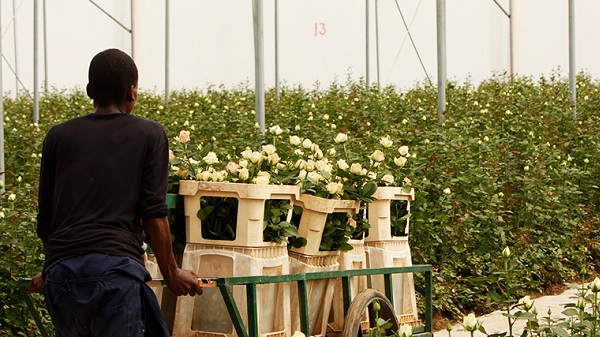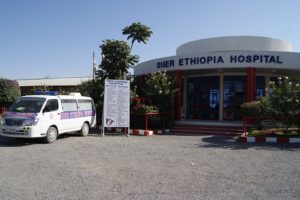
Afriflora Sher possesses the largest rose farm in the world. The farm is located next to Lake Ziway, at a height of 1650 meter above sea level and approximately 3 hours’ drive from the capital, Addis Ababa.
ZIWAY, Ethiopia (IFC)–Ten years ago, the village of Ziway in Ethiopia was little more than a fuel stop on the long road to Kenya. Today, it is a destination itself.
Ziway boasts a modern hospital—the only one in a 100-kilometer radius—a school, and a top-notch football stadium. Builder of these facilities and linchpin of Ziway is IFC’s client Afriflora.
Ethiopia’s largest rose producer and exporter, Afriflora employs 11,000 people in Ziway, 80 percent of whom are women. More than 100,000 people receive indirect benefits from the company, such as access to a school for 4,500 students, better water supply, as well as medical and childcare services.
Afriflora’s first seeds were planted in 2005 by the Barnhoorn family. Flower farmers themselves in the Netherlands, the Barnhoorns understood that success meant investing in more than just roses. “The power of Afriflora is that we cultivate local talent. All our employees grow with us. The town of Ziway is growing with Afriflora,” says Chief Executive Officer Peter Barnhoorn.
Kelbesa Debelo, one of Afriflora’s five farm managers, is an example of local talent. A Ziway native, Kelbesa joined Afriflora six years ago as a flower picker and rose to manager through the company’s leadership program. Debelo learned English on the job, and speaks animatedly about his wife, who also works at the farm, and his son, who studies at the Afriflora school. “If Afriflora grows, my career will also grow,” he says.

Afriflora Sher’s Expansion Plans
Afriflora has expanded 500 hectares in the past ten years—that’s almost one hectare per week. Modern facilities and operations allow the company to export 900 million Fairtrade-certified roses to Europe each year. Greenhouses are built in blocks of nine hectares in Ziway, each containing cold storage, a packing area, employee lockers and a canteen. Stereo systems blast Ethiopian pop songs as workers measure, cut, and pack stems into boxes. Every night, the roses depart for Addis Ababa in refrigerated trucks, then onto Brussels by plane. From Brussels, the flowers are driven to the Netherlands for distribution.
Demand for Afriflora remains high in Europe, where 4.3 billion roses are traded each year. Afriflora will use IFC’s investment of €90 million to expand production by 60 percent, install water recycling systems, and create jobs for 5,000 more people. The company aims to increase sales by tapping into new technologies, such as an automated web platform to directly reach wholesalers.
IFC is not the first global financier to take note of Afriflora. In 2014, global investment firm KKR became Afriflora’s largest stakeholder with an equity investment to support long-term growth.
Afriflora’s success has also prompted cultural changes. Hirut, an executive assistant at Afriflora, remembers how, initially, local workers were puzzled about why Europeans used flowers as ornaments. “The concept didn’t exist here,” she explains. “But now, when we have roses left over, people in Ziway take them to decorate their own homes! These flowers have become part of our culture.”
Source: IFC
——
Other stories:
- EVENT: Hortiflora Expo 2018 in Addis Ababa
- Ethiopian Honey Farmers Struggle with Sticky Traditions
- EHPEA Endeavoring to Promote Ethiopia’s Horticulture Products
- Enset: The Ethiopian Banana That Flourishes in Drought and Heat
- Ethiopia Launches National Horticulture Production and Marketing Strategy
